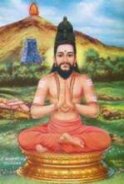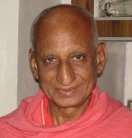

THE ESOTERIC
KANDAR ANUBHUTI
OR
THE SECRET TEACHING ON
GOD-EXPERIENCE
(A Treatise on Adwaitic Realization)
OF
SAINT ARUNAGIRINATHAR

 |  THE ESOTERIC KANDAR ANUBHUTI OR THE SECRET TEACHING ON GOD-EXPERIENCE (A Treatise on Adwaitic Realization) OF SAINT ARUNAGIRINATHAR |  |
 | by N.V. Karthikeyan |  |
| verses contents 27 28 29 30 31 32 33 34 35 36 .. 42 this verse in PDF version (4 parts) p-1 p-2 p-3 p-4 complete download of this book |
VERSE-32 கலையே பதறிக் கதறித் தலையூடு அலையே படுமாறு அதுவாய் விடவோ கொலையேபுரி வேடர்குலப் பிடிதோய் மலையே மலைகூறிடு வாகையனே.Kalaiye patharik katharit thalaiyuudu, Alaiye padumaaru athuvaai vidavo Kolaiye puri vedar kulap pidithoy, Malaiye malai kooridu vaakaiyane. Excitedly screaming the scriptures, and in the intellect Commentary Having now known that the Lord ordained him into this life of Maya because of some terrible and obstructive Karmas, the Sadhaka seeks to solve the problem by embracing the Order of Sannyasa (next verse) as the only solution. Because only by Jnana or Knowledge are all Karmas reduced to ashes. 'Jnanagnih Sarvakarmani Bhasmasat Kurute tatha' says the Bhagavad Gita (IV-37). The sprout of Vairagya or dispassion towards this illusory life was visible in the seeker as early as verse-4 (Valaipatta). It grew little by little in verse-9 (Mattoorkuzhal), then in verse-16 (Peraasaiyenum); it became a big tree in verses-25 (Meiye yena) and 27 (Minne nigar). Now it is flowering into renunciation or Sannyasa which, he thinks, is the only solution to break the bonds of all Karmas, which will further bear the fruit of Jnana ('Vel' in Verse-42) or Anubhuti or God-Realization ('Pesaa Anubhuti' in Verse-43) or Moksha ('Charanam' in Verse-44). So he opens his mind to the members of his family, elders, relatives and friends, who are naturally learned in the scriptures. He tells them that he is planning to leave home and family to take Sannyasa. But, as can be expected, there was great resistance from family members, though some favoured it. As is the case with everything, opinions of people differ and scriptures also give various views, often contradictory and conflicting, as they are meant for people in different levels of evolution. And so there ensue heated debates and discussions among them, quoting different scriptures, shouting and screaming at each other, some for and many against his proposal. As the matter concerns him and he is very much involved in those debates and discussions, his mind got confused and heated up. But he does not want to waste his time in it, since it is clear to him as to what he wants to do! He has decided to act according to the knowledge which was conferred by the Lord Himself (Verse-17), i.e., 'Poomel Mayal poi ara Meippunarviir' -- 'abandoning the delusion on this world, firmly be established in (hold on to) Reality.' Hence the prayer in this verse: "Debating about the scriptures with feverish excitement, and waves of confusion to dash in my head (i.e., brain or intellect), should I get lost in that? (O Lord, let it not happen.)" In this prayer is also implied that he asks for the required will-power and strength of mind to stick to his resolve to renounce the family. Learning has to bring culture and wisdom, and humility has to result from wisdom. Learning is not to become puffed up with pride. Scriptures try to bring home these truths in a variety of ways. They give instances of persons who suffered on account of their vanity due to learning. They also cite references to great men who were humble. They lay down codes of conduct, show ways and means for the development of virtues, prescribe methods of Upasana and contemplation on the Supreme Being, and also reveal the experiences of Realization. The scriptures are to be studied well, understood in their true connotation, and their instructions practised diligently and God attained. Study is to end in practice and practice in experience. The purpose of learning is to live life truly, to have an understanding of life, and to attain God-experience. Learning is to be put into practice in daily life. Learning is to live life, and life is to learn. In short, learning is life and life is learning. To attain God - to have God-Realization - is the purpose of life, which is the purpose of learning, too. The great Tamil saint Thiruvalluvar says, "Of what avail is one's learning, if he worships not the sacred Feet of Him (God) who is Wisdom Supreme (and attains Him)?" (I-2). Our learning should not remain isolated from our living. They should go together. Not merely is learning not to lead to debates and discussions, but also is not meant merely to earn a living, which unfortunately seems to be the aim of the present day education. The education of today does not equip one with the needed knowledge of life - the knowledge that will give strength to face life, steer clear of all problems in life, and attain the purpose of life. On the other hand, when one steps out of the school or college, he is bewildered and knows not what to do next. In fact life stares at him. He has no aim in life, for his education has not given him that, and he is drifted here and there in search of a job. That is all his aim! The education he had has not prepared him to accept the challenges of life, though it might enable him to secure a job. But simply to secure a job is not the purpose of education and learning. Saint Thiruvalluvar, again, says, "Learn well that which is worth learning, and then live up to it." (Kural 40-1). "Wisdom is to experience the truth, in one's own experience, of what has been heard or learnt from whatever source."(Kural 43-3). So neither securing a lucrative job nor wasting one's life in mere reading and debating is the purpose for which learning is meant. If learning enters into our life and forms part of our being, we become humble, realising the greatness of God; and then we have a true understanding of what the scriptures purport to convey through their variegated teachings. But when it does not become part of us and remains only in the books or in our brains, then it is that we become proud and egoistic and find it difficult to reconcile between the apparently contradicting instructions and then we start contending and entering into heated debates with similar others. And, what happens in religious debates and controversies? Man loses his decorum. He shouts and screams, and decries the other's view. He gets mentally agitated and upset, and feverishly excited. His brain gets confused and confounded. This is what is generally seen among the highly learned in whom their learning has not entered into their hearts but remained only in their intellects. Their whole life goes in studying scriptures with a view to find flaws in them, to enter into controversies with others, and parade their vanity. They get caught up in the intricacies of the scriptures by entering into heated arguments and their learning becomes a burden and bondage; they lose the purpose of learning and the goal of life, too. Hence, the prayer, which is a warning and a caution to us: "Am I to enter into heated debates, get mentally agitated, scream at the opponent, get my intellect confounded, and thus, be lost in my learning and arguments? Lord, let this not happen. Let me not forget that the purpose of learning is to attain Anubhuti. Bless me that I may not be distracted and side-tracked by my learning." Valli was found by the hunter-king Nambirajan and was brought up in the midst of hunters. Hunters live by killing animals in wild-games. They are cruel by nature. Though Valli lived amidst them, she was of divine nature; she was gentle like elephants, which walk softly, without making a sound. Valli is the Jivatman and the cruel hunters, in whose midst she lived, are the turbulent mind and senses. The nature of Jivatman is quite different from that of the latter. While the mind and senses are ever engaged in the wild-game of sense-pleasure, the Jiva depends on the Lord because it belongs to the Lord. Valli is compared to an elephant and the Lord to a mountain. Mountain and mountain-forests are the abodes of elephants. So is the Lord the real abode of Jivas, not the hunters or the mind and senses (body). Lord Velayudhan wears victory garlands, dangling over His chest, on account of His victory over Surapadman and other Asuras. He has the Vel, which is the Victory-Vel. Lord Skanda's Vel killed the Asura Kraunchan who was cursed by Sage Agastya to remain in the form of a mountain till he came to be destroyed by the Lord. The hands of the Lord that killed the Asuras also embraced Valli Devi. This means that the Lord is a terror to the wicked and a beloved to the devout. He is law and love at once. To that Lord Velayudhan, is the prayer, "O Lord! Thou killed the Asuras and the Krauncha-mountain and wearest victory-garlands. Thou accepted Valli in thine divine-fold. Pray, let not my learning (which is given by thee: verse 17) lead to vanity and debates; let it bring me Anubhuti (God-experience)." |
| contents 27 28 29 30 31 32 33 34 35 36 .. 42 this verse in PDF version (4 parts) p-1 p-2 p-3 p-4 |
| ... www.kaumaram.com ... The website for Lord Murugan and His Devotees முகப்பு கௌமாரம் அட்டவணை மேலே தேடல் home Kaumaram contents top search |
Kaumaram.com is a non-commercial website. This website is a dedication of Love for Lord Murugan. Please take note that Kaumaram.com DOES NOT solicit any funding, DIRECTLY or INDIRECTLY. |